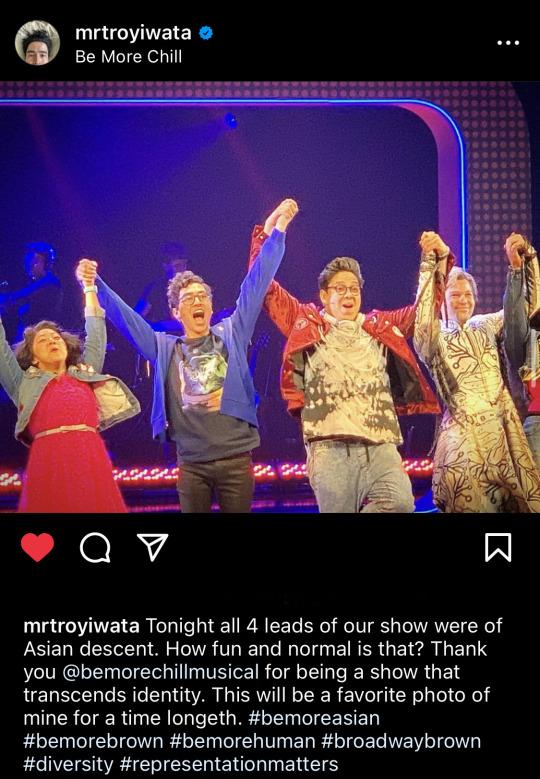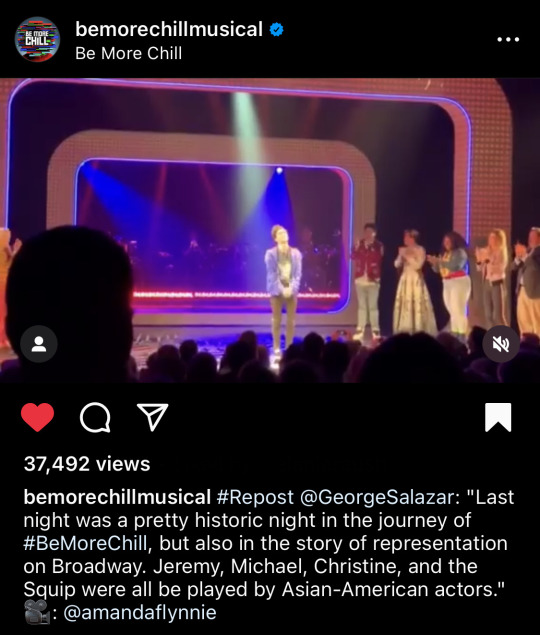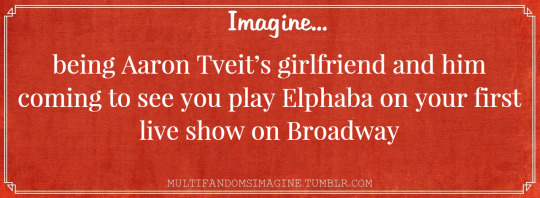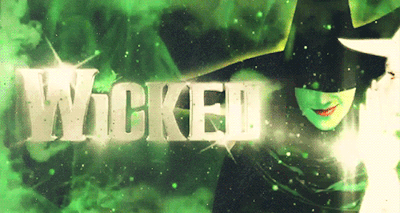#playbill article
Explore tagged Tumblr posts
Text


"When I saw Pippin on Broadway… I recognized myself on the stage. I felt that choreography in my bones, and in my soul. I didn’t know who Bob Fosse was, I didn’t know that I was talking about god. I just knew that I had to do that.” - Bebe Neuwirth
#pretty person is pretty#bebe neuwirth#i went on playbill dot com to look up some things for marin mazzie and was treated to a massive banner for this featured article#feels right that it happened like that
41 notes
·
View notes
Text
In Cabaret, Set and Costume Designer Tom Scutt Wanted to Celebrate Queer Individuality
The British designer is currently double nominated for his work in the Broadway revival, which allows audiences to sit in the Kit Kat Club.
BY DYLAN PARENT JUNE 05, 2024

Tom Scutt is a stickler for details. For the designer, who headed the redesign of the August Wilson Theatre for Cabaret at the Kit Kat Club, the show isn’t only on the stage. It’s all around the theatre. As Scutt sits in the Green Bar, one of the many new audience lounges built for this revival, he shows off the space’s floral-patterned fabric.
“The Green Bar sort of became a bit of a manifestation of [Sally Bowles],” Scutt explains. “The seat covers in here are the same fabric as her suitcase in the show.” If, during Act One’s playful “Perfectly Marvelous,” one is seated on the correct side of the in-the-round stage, one might be able to peek inside Sally’s open, Mary Poppins-like suitcase decorated with butterflies, tassels, and hand drawings.
Explains Scutt: “I like the idea that the Kit Kat Club is real at a certain level. It's actually just a kaleidoscopic prism of the stuff that's happening in the show. [The Green Bar] is an extension of the dream idea. You're walking around the dream.”

Cabaret follows a young, queer American writer, Clifford “Cliff” Bradshaw (Ato Blankson-Wood) as he arrives in 1930s Berlin. On his first night, he finds himself in the seedy Kit Kat Club watching “the toast of Mayfair” Sally Bowles (Gayle Rankin) perform. Struck by her vivacity, impulsiveness, and green fingernails, Cliff finds himself beguiled and Sally moves into his apartment. But their Bohemian love bubble bursts as the Nazis rise to power. The revival, currently performing at the August Wilson Theatre, was nominated for 9 Tony Awards, including Best Musical Revival.
Scutt has been doubly nominated for Best Costume Design of a Musical and Best Scenic Design of a Musical, no doubt because of how he completely transformed the August Wilson into the Kit Kat Club—from the time the guests enter the space through a special side entrance (going back in time to 1930s Germany), to when they sit down for the show (which is now performed in the round).
READ: See How Cabaret Renovated the August Wilson Theatre
“I think it's easy to write off a lot of what we've done in Cabaret as frivolous or style over substance, but that's wrong,” Scutt says definitively. “Maximalism and drag and dress up are so incredible at giving you political messages with humor and wit and vitality. It's sort of naughty and silly, and it just feels quite cathartic to get into one of these places that feels quite sterile often, and to just liven it up so that when people walk in here, they're just sort of tingling a bit.”
Scutt is the white, British son of an English and drama teacher, who was raised to be “well-versed” in the works of William Shakespeare and Richard Wagner. But, as he grew up, he discovered his queerness. As that identity grew stronger, Scutt “found there was more going on in me than the sorts of worlds that I've been brought up into could offer. I'm always looking for ways to subvert things within the confines of what we are given.”
As a designer working to untangle the knot that is created when working on a piece that is inherently political, but presented in a commercial landscape, Scutt tried to balance “ferocity of spirit” and queer joy—in a musical that’s also about the rise of fascism. The way to do that was through contrast.

“I wanted the beginning of the show to feel incredibly exuberant and unique and youthful and free,” Scutt says. “We wanted the end to feel the opposite of that.” That playfulness is captured, in part, by the 12-person Prologue company—performers who vogue and play music amongst audience members in the lobby spaces of the Kit Kat Club approximately 75 minutes before showtime.
Citing wit and “bawdiness” as values found in drag performers, and countercultural artists as inspiration, Scutt’s Kit Kat Club is a feast for the senses. There are neon lights, decadent gold accents, beads, baubles, and fringe curtains bedecking the thoroughly transformed Wilson. Those details gradually ease the audience into the performance. Then on the stage, Scutt’s costuming completes the picture. “Willkommen'' is truly a greeting for one and all as ensemble members leap, wink, and strike poses in bespoke outfits. For every ensemble performer, their Kit Kat Club costume is entirely their own, based on the actor’s strong identity. Some notable Kit Kat Club dancer costume details: a shooting star, a teeny tiny hat perched slightly askew, and balloon-like peasant sleeves worn like opera gloves.

Texas costume for Cabaret on Broadway Sketch by Tom Scutt/Photo by Marc Brenner
“What I've done is [created] a system whereby the swings of the Kit Kat club are all in their own character as well,” Scutt says. “They never step into someone else's costume. I often go back to the show in London, and I'm just seeing a combination of people and costumes that I've not seen before. And, for me, that feels alive and that feels living and it feels unpredictable.”
But Scutt is also aware of how brash moments of choreography, when coupled with lacy costuming, can feel oversimplified and oversexualized in its queerness. In this interactive iteration, at the forefront of Scutt's mind is the potential for boundary crossing, even violence, especially as the audience is not always representative of those who frequent queer nightlife spaces.
“[Director] Rebecca [Frecknall] and I were absolutely adamant that we could find a way to celebrate these Kit Kat Club performers and their bodies without it feeling very vulnerable,” Scutt says. “The angle that Rebecca and I took was about ferocity and confidence. The [performers] are not necessarily out to try and get you to be seduced by them. [They] are actually out there to express themselves and to share who they are in their character. That's the self possession that is needed.”
Rankin’s Sally Bowles draws the clearest line between clothing and agency as she finds herself. Describing Sally as “her least happy” in her first number, “Don’t Tell Mama,” dressed the part of a melancholy-yet-mischievous clown child in lacy pants, Scutt points out that Sally is swinging on the pendulum between demeaning performance and naked vulnerability. Not literally naked, he clarifies, but exposed, wig ripped off.
As a contrarian thirsting for meaning, fame, love, Sally paints her nails green. “Green is, like, historically difficult, and people say you shouldn't wear it,” Scutt says playfully. “Of course she's gonna wear it, you know? Of course she'll do whatever everyone else tells her not to.” This is also reflected in Sally’s fur coat, which in this new version is a pastel green. Pulling from ’90s grunge and It Girls (Courtney Love in particular) of that era, Scutt cites the continuation of green in Sally’s prized fur coat as something that is “probably offensive and not necessarily beautiful, but punchy.”

Sally Bowles costume for Cabaret on Broadway
For Scutt, Sally is experimenting through clothing, not unlike a child, working out who she is and who she might want to be. The first time the audience gets a glimpse of her natural hair is during “Maybe This Time,” a ballad bemoaning lack of luck in love sung with the heart of a true romantic. The wanting is a wave crash upon the stage of the cabaret, her body is barely concealed in the liminal space of a dressing gown.
Then it’s Sally's descent, “or assent, depending on which way you look at it,” into a suit in the final number, “Cabaret,” that Scutt says is the most reflective of Sally’s inner turmoil. When asked by Cliff to “wake up,” leave the Kit Kat Club, and run to a boat bound for America, to safety, Sally turns the metaphorical mirror around to her lover, challenging him to look at himself.
“She takes Cliff’s suit off of him and wears it,” Scutt explains. “It’s almost a kind of martyring. She sort of just takes it and sacrifices herself so that [Cliff] can be free.” In the spirit of a true rock star, Sally’s personal breakdown in “Cabaret” is an artistic breakthrough. “The performer that she really is is maybe brasher and fiercer and more unhinged [than before], but it is pure creativity flowing out of her,” Scutt says, likening her to a phoenix. “When she's in her underwear and that suit, she is at her most free as an artist. I love that version. I prefer that version.”

Emcee costume for the musical number "Willkommen" in Cabaret on Broadway
For Scutt, much of Cabaret is poetic, abstract, open to interpretation. And no character is more fluid than Eddie Redmayne’s Emcee. First appearing in “Willkommen” in a child’s party hat, a mantle of mischief as delicate as paper, the Emcee conducts with black rubber fetish gloves, encouraging the antics of his misfit toys.
But, as the Nazis start to rise, “his mask starts to be stripped off,” Scutt says. “He literally takes his wig off in one scene, and then from that point on, he becomes a skeleton and a clown. He's kind of like a cautionary tale for me.” The skeleton, a goblin in semi-sheer black fabric, clinks his claws like coins in “Money,” part Babadook, part propaganda, all horror vernacular. However, in tackling the rise of white supremacy, Scutt says he and Frecknall sought to look at “the responsibility of the white man as master of ceremonies” in the oppression of Jewish people, people of color, queer, and trans people. As facism becomes the rule of law, beige blots out the colors, textures, and markers of individuality with which we’ve become familiar. Makeup-free faces, neat, slicked-back hair, and fawn-colored suits complete a new uniform, one of chilling sameness.

Emcee costume for the musical number "Money" from Cabaret on Broadway
For Scutt, that gives this Cabaret a chilling resonance to contemporary events, as there's been a rise again in inflammatory rhetoric and violence against queer people. At the same time, this production has been the most emotionally authentic piece he's ever done. In seeking to give company members ownership over their queerness, their artistry, their individuality, Scutt has affirmed his own queer identity.
“Cabaret has been really, truly, the first show where I feel like it has demanded the truth from me,” Scutt says. “The piece just pulls it out of your heart. It is rooted into your heart and it demands that you show yourself, and stand up for yourself, and stand up for the people whose views you share. And I think that that has become a beacon for me of what to expect from my work and my collaborations…I've done many, many projects that are large-scale, but none of them have fed me in the same way because I'm able to pour out my heart in a way that we never normally get the opportunity to, as designers. There's authorship in that. There's collective authorship in what each and every one of the creatives on the show are doing. It's the most dear experience. It's incredible.”
https://www.playbill.com/article/in-cabaret-set-and-costume-designer-tom-scutt-wanted-to-celebrate-queer-individuality?fbclid=IwZXh0bgNhZW0CMTEAAR2aihorhZj0BtjAZOvmD0tc6BRbLQnotZ8zGyuWH2RFcdJEGOer_ORdYo8_aem_ATYeABJ1gSDP9lgfa9qTWwKZqhnxAQqKtnLfC-tjLW4WDzSrHMiM4vl5ZQPVY_JJuXApCLZG0EYmKgtvdihbdzaW
#eddie redmayne#tom scutt#design#tony nominee#august wilson theatre#costume#broadway#broadway world#playbill#article#cabaret nyc#cabaret 2024#cabaret#the emcee#emcee#sally bowles#texas#eddieredmayneedit#*
16 notes
·
View notes
Text
I have like, a small flicker of hope for the revamped version of the Shaina Taub/Elton John *Devil Wears Prada* musical because it’s clear from Shaina’s work on *Suffs* that she’s willing to kill her darlings and compromise on ideas if it will help the show work better for the audience, which *Devil* needs badly because from the reviews the Chicago production got, basically none of their original approach landed well so there’s a lot of work to be done.
#her article for Playbill about how she took Suffs from The Public to Broadway is suuuuper interesting#obviously she’s not the only creative involved#but it’s a good sign that someone in the room has experience turning around a weakly received production
2 notes
·
View notes
Text

Derek's birthday was listed along with many Broadway stars who have a birthday in the month of October in the Playbill!
2 notes
·
View notes
Note
abt the play, do you think it has to do with the WGA strike? like is this a way for them to currently work on content that isn’t under amptp
So like, TFS has definitely ended up as a way for them to work on stuff currently during the strike, but I'm almost certain that happened by chance rather than being the plan all along considering the actual timeline of events with the strike/information we’ve gotten about the play:
The Duffers announced back in July 2022 that they were going to be producing live theatre related to Stranger Things, and The First Shadow was announced in March 2023. The WGA voted to authorize a strike in April 2023, and the strike began in May 2023.
And like, here’s the thing. I have little doubt that by March when they announced TFS, the Duffers & other writers/members of the WGA were well aware that the possibility of a strike was looming on the horizon.
BUT. Writing and producing a new play is a big involved and time consuming endeavor even when on a small scale! So when it’s with something like this that is going to get lots of attention and have lots of moving pieces and be part of an intricate larger story because it’s related to fucking Stranger Things? That’s something that was absolutely already being worked on well before we ever found out about it (and again, while we didn’t know specifics until earlier this year, we did know there would be some form of stage play literally a whole year ago now) and thus well before the WGA strike was even close to an established plan of action.
#i just so distinctly remember the day the first ‘stranger things is getting a play!’ announcement dropped#bc tht was when my friend was in the midst of getting ready for his upcoming off-broadway parody musical of stranger things’ run to start#(which is mentioned in the playbill article i linked. teehee. proud of my friends)#and he was just ‘OH GOD. I DONT WANNA GET SUED’
2 notes
·
View notes
Text
which side note when I was looking up what voice part raul esparza is, I found an article on playbill which makes the claim that “Esparza can be thought of as his generation's Mandy Patinkin” and. Jesus Christ. im not sure yet if I agree but like Jesus Christ [alexander rybak voice] every night I fall in love
#the article also has a link attached to Mandy’s name and the link! goes nowhere#thank you playbill. very cool
1 note
·
View note
Text
OG Falsettos casts Revival Falsettos in an old playbill article.
Well, one of them guessed right. It probably helped that Michael did two previous shows with Christian, during which Christian fangirled about Falsettos and Marvin. It is really cute that he did think of him.
Leslie did attend opening night and I think this is the first time I’ve heard from Jonathan since the original closed. It’s cool that he came back for this.



#falsettos revival#falsettos#michael rupert#christian borle#chip zien#brandon uranowitz#stephanie j block#stephen bogardus#andrew rannells#barbara walsh#leslie kritzer#jonathan kaplan#anthony rosenthal#carolee carmello#heather mac rae#tracie thoms#betsy wolfe#marvin falsettos#whizzer brown#mendal falsettos#trina falsettos#jason falsettos#dr charlotte falsettos#cordelia falsettos#jack broderick#lisa howard
67 notes
·
View notes
Text
The three main male companions are all different flavours of theater kid
Wyll is a diehard Broadway fan. He knows every word to Hamilton. He thinks &Juliet is superior to the Shakespeare play. He collects Playbills. He unironically watches Glee.
Astarion loves the niche stuff. He reads the scripts of long forgotten plays for fun. His favourite actor doesn't even have a Wikipedia article. He nurses a burning hatred for Phantom of the Opera.
Gale is a stickler for the classics. He has a total of thirteen different copies of Macbeth. His version of 'modern' theatre is the works of Willy Russell. Phantom of the Opera is his bread and butter (it's a recurring point of argument between him and Astarion). He still cries watching Les Mis
114 notes
·
View notes
Text
Important Announcement About J. Antonio Rodriguez’s Absence
A Playbill article was published today, about why J took an extended leave from Hadestown. As he has said before, he’s a Dreamer, which means he was brought to America as a child, without documentation. The program that allows him to work and live here, DACA, requires he renew some paperwork every two years.
It usually takes a couple days to renew, but due to delays (caused both by Trump’s policy changes and an influx of new immigrants to process), he has been waiting for multiple months. He is not the only one.
Until it is renewed, he cannot work or drive. There is no way to know how long renewal will take.
A petition has been made calling for DACA to prioritize renewals that have been pending for over 100 days. Here is the link.
68 notes
·
View notes
Text
@outmagazine This gay #theaterkid was saved by the arts! 🎭 “It was a place where I could scream and sing and laugh and cry and kind of get out everything that I was bottling up as a teenager,” Tony-nominated actor Jonathan Groff tells Out’s editor-in-chief Daniel Reynolds in our May/June cover story. You can read the article at our #linkinbio or pick up your own #PrideMonth issue with cover star #JonathanGroff at a newsstand near you. 🌈✨
🎥: @deanisidro & @dasha_brook, @merrilyonbway
✂️: @jade_7.0
#merrilywerollalong #broadway #groffsauce #theater #theaterlife #playbill #lgbtq #outmagazine #bts #reels
40 notes
·
View notes
Text
A rough attempt at documenting the differences between Suffs Off-Broadway and Suffs Broadway
I will note some of these are subjective evaluations, and your personal experience of the characters may differ from my take. (EDIT: If you want the perspective of the composer herself, Shaina Taub just wrote an article on Playbill outlining the songs specifically.)
spoilers abound!
Changes to characters
Alice is probably the character that changed the most. Shaina Taub has talked in interviews about how she was hard to write about because she basically had no personal life. At the Public this translated into her character just being focused on the movement which, even if it was historically accurate, made it really hard to connect with her as a character. The Broadway version tries to get into her head a little more, particularly with the song "Worth It", and it's overall pretty successful on that front.
The Congressional Union for Woman Suffrage organizers get a lot more characterization than they did Off-Broadway: besides Alice and Inez, probably the character that felt the most pronounced was Ruza (I mean, the character is basically a working class stereotype, so she's going to make a huge impression regardless); Doris coming a close second (she was portrayed as significantly more timid and youthful); and Lucy unfortunately coming in third, with the primary issue being very little was shown of her and Alice's friendship, thus making "Lucy's Song" feel a bit out of nowhere. Actually, it felt like Inez was Alice's confidante more than Lucy. The Broadway version adds more scenes of the characters getting to be themselves and, again, giving us more of a chance to connect: more stuff about Ruza being "scary"; more chances for Doris to grow as an activist; more scenes of Lucy's friendship with Alice–it's more clear that they are the two closest friends among the group.
Mary Church Terrell and Phyllis also came off as a bit flat in the Public version, overall feeling underdeveloped: Mary was designed as a foil to Ida but it didn't feel like they were really in disagreement beyond us being told as such; and Phyllis basically had no personality other than "kid." On Broadway, we see more arguments between Mary and Ida which helps us get more into their perspectives; and Phyllis makes an impression right off the bat when she's annoyed at the situation she and other black women have been placed in with the march.
Carrie and Mollie being a romantic couple basically came out of nowhere in the Off-Broadway version: although they are shown at each other's side constantly, we don't get an actually romantic moment until the "If We Were Married (reprise)", and even then they didn't kiss. The Broadway version makes it a bit more blatantly obvious from the get-go that they're a couple (although I've seen some reviewers miss that).
Changes to the script
Overall, the plot of the show is the same: it hits the same story beats, the songs function similarly. But a lot of songs that, admittedly, felt a little extraneous at the Public, were turned into dialogue. This has the effect of the script flowing a little faster.
Also, the Public's version felt more like a play-by-play of history than a dramatic story. That's not necessarily a bad thing, but with the length of the show it's easier to connect if it feels like the characters are going through dramatic arcs.
There are fewer depictions of the suffragists' detractors, such as violent male counter-protestors during the march, authoritarian figures being condescending, or even a group of anti-suffrage Southern women. Most of this is now either described, or concentrated in scenes with Wilson. In fact, a lot of the more Brechtian elements, i.e. the actors portraying caricatures of men, are concentrated in the depiction of Wilson as a buffoon.
One thing I noticed that I thought was interesting: Pointed lines such as Alice telling Ida to "wait your turn" or Alice realizing she's the "old fogey" got much bigger reactions on Broadway than at the Public. I'm not sure if that's just because Broadway audiences are slightly different from the season ticket holders at the Public, but I think some of that has to do with the Broadway version doing more to make the audience connect with the characters.
Cut songs
Much has been said on this topic, but Suffs was a sung-through musical in the vein of Hamilton when it was at the Public. The Broadway version has quite a few of the same songs, but it's kind of staggering just how much Shaina Taub got rid of and replaced with dialogue.
"Watch Out For The Suffragette" - This opening number had the ensemble in drag (in a loose sense of the term: mostly they were wearing mustaches) complaining about the suffragists and mocking them. The tone was distinctly Brechtian: poking fun at at chauvinist men by portraying them with a huge group of women. It had a very cheery tone but, quite frankly, didn't tell the audience anything about the characters. Shaina Taub's take on why she cut it was that it also fails to give much historical context, something an audience needs from the get-go.
"Suffrage School" and "Alice & Carrie" - A much longer sequence of songs depicting the NAWSA convention. The motif "We stand united in sisterhood..." originates from this sequence. Carrie gives a lecture about the progress NAWSA has had, and Alice mocking her enthusiasm; Alice pitches her idea for the march, and her insistence that "now is the next time" was an actual musical motif (which would get 2 ironic callbacks: Carrie invoking it to Wilson, which is still in the show, and Robin invoking it to Alice in the final scene). This whole sequence became dialogue, as did most of the callbacks.
"Finish the Fight" - Hang on, isn't this still in the show? Well, yes and no. There's echoes of it and it's still basically Alice's "I Want" song, but the version of this song that was at the Public was an almost completely different melody and was mainly focused on Alice expressing her singular drive. We also had a bit where Alice pretends to be someone tasked with cleaning up NAWSA's DC office so she can use it as an organizing base.
"Find A Way Coda" - This took place after "Wait My Turn" and had more of the organizers' reaction to what Ida said.
"An Interview with Mary Church Terrell" - Mary flags down a reporter (played by Jenna Bainbridge) and introduces herself and Phyllis. This would have explained why they were marching in the college delegation.
"The March" - A different melody, helmed by the repeated phrase "We demand an amendment, we demand an amendment, enfranchising the women of the country." There was some vivid depiction of them being physically and verbally assaulted during the march, with the ensemble briefly taking on the role of their attackers, and Major Sylvester refusing to protect them. This all got cut so that it's only described briefly. There was also a brief verse performed by a Chinese woman named "Mrs. Wu" (played by Mia Pak, or Jaygee Macapugay during the weird week where everyone in the cast got sick–long story), who sings about bringing her baby to the march as a way to show her bravery when she is older. There was also a brief scene at the end of the song of Wilson arriving in D.C., and singing "Where are all the people" meant as an ironic echo of Mary and Phyllis Terrell singing "Look at all the people" at the top of the previous song.
"After the March" - The characters read out the newspaper articles reporting on the march. We would also get a brief glimpse of Mary and Ida talking about their different views on direct action vs. working within the system, which became dialogue for the scene before the March in the Broadway version. Inez leads a rousing toast to all the horrible men she's encountered in her life and career, with the other women joining in with their stories – a predecessor to Broadway's song "G.A.B."
"The Inez I Know #1" - Inez confronts Alice at the end of a long day and tells her to take a break. Alice refuses, insisting that she needs to focus on the movement. The Broadway version largely replaces this with a scene of Lucy and Inez discussing Alice's dating life to her face, leading into "Worth It."
"Unfurling the Banner" - Instead of calling Alice to confront her disrupting Wilson's speech, Carrie would have caught Alice right before she was going to do so. This would be the scene where Alice calls her an "old fogey."
"The Convention" - An uninterrupted sequence, showing Mary's speech that Ida criticizes her for, and the CU calling for Wilson's re-election and getting refuted by Carrie.
"The Inez I Know #2" - A reprise of the earlier song. Instead of in the Broadway version where Inez tries to quit at the train station, she approaches Alice in their offices. There's an added moment where she reveals she can't have children, which was cut on Broadway.
"America When Feminized" - The Act 2 opener, another Brechtian tune sung by Hannah Cruz as an Uncle Sam-type character warning of the "dangers" of letting women have rights, leading into showing the organizers in prison.
"Belly of the Beast" and "Mister President, Something Terrible Has Happened" - A longer intro to the characters getting imprisoned, including depicting the show trial where they are convicted of obstructing traffic. Just the part of Dudley telling the president remains, and it's been changed into dialogue.
"Comrade, You're Right Where I Left You" and "The Strong One" - Inez's ghostly visit. At the Public, Dr. White was played by Phillipa Soo, who would then morph into Inez (to be interpreted as Alice's hallucination). This had my personal favorite cut bit, which was Inez singing that she is the ghost of Susan B. Anthony. Obviously the joke is still there, I just think it was funnier when it was dramatically sung.
"Relentless" - A slightly different spoken-word declaration of Alice's devotion to the cause. At the Public, she was opening up about her uncertainties about the movement. I can understand why this was changed: Alice's uncertainties get introduced much earlier now on Broadway, and it does make more sense for Dr. White to have refused to commit Alice based on seeing and understanding her bravery rather than just hearing about her insecurities.
"Ladies (reprise)" - Preceded by an entire sequence where Grace MacLean quick-changed in a blackout into Edith Wilson, which got the biggest laughs of the night. This depicted Edith as being de facto president after Wilson's stroke, and she recognizes that power upon seeing an edict about women's suffrage... only to abruptly tear up the edict and declare she won't support it. While this was one of my favorite parts, I can tell why it was cut: because Edith is a one-off character, there's no opportunity to delve into the complicated hypocritical mess of why she was against suffrage.
"Anti-Suffrage Rose" - An ironic echo of the "We stand united in sisterhood" line, sung by a group of anti-suffrage women.
"A Telephone Call from Mary Church Terrell" - Basically a reprise of "An Interview."
"I Wasn't There" - A somewhat bitter song about how the 19th Amendment was signed by a roomful of men without much fanfare.
"August 26th" - A song about the amendment's certification. It was basically a reprise of "After the March", reusing some of the melodies.
"Me, the Old Fogey" - Robin had a whole melody expressing all the radical movements she supports, in counterpoint to Alice's now-antiquated views. This became dialogue, save for Alice straight up saying "Me, the Old Fogey", and Robin now gets to sing a reprise of the new version of "Finish the Fight."
"Never Over" - This had the same purpose and general message as "Keep Marching", but with more of a focus on the younger generation, with a refrain of "The Younger at the Gate", referencing the original Act 1 finale (what is, again, now the Act 2 opener).
Changes to existing songs
"Ladies" - The lead-in to Alice's phone call with Carrie did not exist: instead, we just see the women leave the oval office and Wilson sings a brief reprise that nails his misogynistic viewpoint: "I love 'em, until they start to speak." Removing this bit gets the plot going quicker. Plus, we kind of already know Wilson's a pig.
"If We Were Married" - The song didn't change as far as I can tell, but the lead-in was slightly different Off-Broadway: Doris actually went to the bar by herself, while wearing one of Inez's gaudy hats, which created an endearingly awkward moment for her. On Broadway, Ruza accompanies her, which allows for more character interaction.
"This Girl" - As mentioned, "This Girl" was originally placed before the 1916 convention scene, with Carrie responding to being called an "old fogey" in private. Moving it into a response to Alice's public speech gives a little more oomph, as it reads as more egregious that Alice publicly criticized her.
"The Young Are At The Gates" - The basic melody and most of the lyrics are the same. However, one key thing to note is that this song was the original Act 1 finale. At the Public, this created a kind of weird "false ending" to "How Long?": "How Long?" felt like the perfect button on the story of Act 1, and the audience's reaction was essentially "Intermission time!" only to see there was another song. Good change on that front. I will also note there was more depiction of Wilson getting annoyed with the suffragists, as well as a depiction of him giving his speech announcing the U.S. joining the war – with his actual words set to music.
"On the Trail" (Off-Broadway)/"The Campaign" (Broadway) - The overall tune was the same, but Off-Broadway the song was more broadly about the various campaign speeches the suffs gave. One such speech is delivered by Nina Ottero-Warren (played by Susan Oliveras), a real Hispanic suffragist. She and the aforementioned Mrs. Wu scene stand as honest efforts by the production to highlight women of color that unfortunately had to get cut. And I understand why: not going very deep on who these people were felt like tokenizing, but going any deeper would frankly draw attention away from the story at a crucial point.
"Fire & Tea" - The bulk of the song remains the same, but Ruza takes charge at the start as opposed to being given a cue by Alice. Additionally, Doris breaking the fourth wall to exclaim "He actually said that!" when he gives his speech in support of suffrage is new. It is one of the much-appreciated rare moments where the show calls out its history.
"If We Were Married (reprise)" - Originally, Doris and Dudley sang alone, followed by another scene of Carrie and Mollie. The song was shortened so the two scenes now take place simultaneously.
New songs and what they added
"Let Mother Vote" - The new opening number serves the double purpose of throwing us right into the plot of the show and introducing the mindset of one of its characters, thus setting the stage for the conflict between Carrie and Alice. I also think Carrie addressing the room as just "gentlemen" really sets up what the suffragists are up against in a much simpler and more succinct way than the original Brechtian approach could.
"Finish the Fight" - Again, this is more of a rewrite of a pre-existing song, but the new version does more to explain why Alice wants to achieve these goals, while the old version just stated the goals.
"Terrell's Theme" - The "lifting as we climb" motif is new to this version, although it reuses a melody from Terrell's speech at the convention in the Off-Broadway version. Originally, Terrell's motif was a wordless chant of three notes, repeated.
"G.A.B." - I will admit, I thought Suffs was a bit of a girlboss (negative) musical at the Public, so under those circumstances I would have found a song like this annoying. But I actually really love this song in conjunction with the numerous other changes Shaina Taub made: again, it makes the organizer characters feel more human instead of just historical figures.
"Worth It" - This is the song that gets us more into Alice's mindset about why she feels she can't have much of a personal life.
"Show Them Who You Are" - Alice takes on a more active role in convincing Inez to go on the campaign, whereas in "The Inez I Know #2" she just invokes Inez's past actions.
"Insane" - As I mentioned, because we get more insight into Alice's mindset earlier in the show, Alice's speech to Dr. White is less about her opening up to him and more asserting she still believes what she believes, hunger strike or not.
"Let Mother Vote (reprise)" - This gives some finality to Wilson's arc in the show: where Off-Broadway he meets a kind of sticky end offstage, in the Broadway version he more or less gets to have a last word before exiting the show. Of course, we're nowhere near as invested in him as we are literally everyone else, but as a bit of the antagonistic clown character, I think it provides some needed closure for the audience.
"I Was Here" - As opposed to the bitterness lying in "I Wasn't There", this lets the characters assert that they got to witness a historic moment.
"Keep Marching" - More of a call to action than "Never Over" was. I think that's a pertinent thing to do, quite frankly.
26 notes
·
View notes
Text
Fantastic article Assad did with Playbill! I highly recommend reading the whole thing, it’s chock full of great Assad and Armand facts!
28 notes
·
View notes
Note
in what episode did you see assad say he was playing minecraft the whole time?
There was a separate interview that was going around, I went on a quick google journey to find it because I need as many people to be delighted about this as I am! I found an interview/article with Playbill HERE that's a great read about Assad and his approach towards/thoughts about Armand; it's a little ways down where he talks about the prop master having Minecraft, solitaire, and pool downloaded onto the ipad that he has. He goes on to say specifically that "A lot of the scenes that you see in season one, where I'm just in the background, I am playing Minecraft. And now, in season two, the iPad is bigger, and it's more advanced, but he’s still got his video games."
I just love hearing about unique and silly tidbits/easter eggs in movies and television so this was so incredible. Also like many other fans the entire image of this centuries-old uniquely layered and intense vampire playing Minecraft in the background of everything else going on in that penthouse that he is and isn't involved in is so choice tbh
#iwtv#assad zaman#the vampire armand#please read this interview please find joy in assad and devastation in armand with me#MINECRAFT THE WHOLE TIME#LOSE YOUR MIND WITH ME PLEASE#THANK YOU FOR THIS QUESTION IM SO GLAD I GOT TO SHARE
23 notes
·
View notes
Note
There was an AAPI BMC???
Okay so there’s 2 answers to this!
Thought not AAPI specifically, there was a Japanese production of Be More Chill and there were specific performances of Be More Chill Broadway that were important in terms of AAPI representation on Broadway.
For the Japanese production, it was an official production of the show in Japan with the same creative team as Broadway and London. It was almost entirely in Japanese and used the 4.0 script from the London run. It had an entirely Japanese cast.

Be More Chill has 4 leads, Jeremy, Michael, Christine and the SQUIP. During its Broadway run, 3/4 of those were usually played by actors of AAPI descent (George Salazar, Stephanie Hsu, and Jason Tam). Then one performance when Troy Iwata, another AAPI actor, went on as the understudy for Jeremy, Be More Chill became the first show on Broadway, that was not specifically about being Asian, that had all 4 of its leads be played by actors of AAPI descent (if the specifics of this are wrong someone please correct me).


Playbill article
#bmc#be more chill#bmc lore#troy iwata#stephanie hsu#george salazar#jason tam#musicals#broadway#shut up dani#jeremy heere#christine canigula#michael mell#the squip
87 notes
·
View notes
Text


According to the Playbill article, they listed 'A Holiday Spectacular' as one of the seventeen favorite Hallmark films (featured Broadway stars) to watch during the holiday season! Go check this film out on the Hallmark Channel! Derek and Ginna Claire Mason are wonderful!
#derek klena#broadway#ginna claire mason#film: a holiday spectacular#films#a holiday spectacular#playbill#article
1 note
·
View note
Text



Imagine being Aaron Tveit’s girlfriend and him coming to see you play Elphaba on your first live show on Broadway
——— Requested by anonymous ———
Giving the fan a nod and a smile as they walked away to their seats with the playbill he just signed clutched tightly to their chest, Aaron turned forward and began to open his own playbill. Flipping through the pages, he skimmed through the articles and ads until he reached the page he was looking for: the cast information. Right there on the first row was your smiling face looked straight at him.
He knew you were probably trying to calm your nerves in your dressing room as you counted down the minutes until it was time for you to go the stage if yesterday was any indication. Aaron had spent all of yesterday helping you with one more practice session, going over your lines and reading through the lyrics with you to make sure you knew everything.
It was after you seemed to know everything forwards and backward that he took you in his arms and tried giving you a pep talk as you were still feeling anxious about your stage debut.
"Hey what you're feeling is totally understandable. Everyone in theater gets nervous about their first time on stage. I know I was in Hairspray."
#aaron tveit x reader#aaron tveit imagine#aaron tveit imagines#celebrities x reader#celebrities imagines#yoshino writes imagines#i had such a hard time writing this one for some reason#i rewrote it like five times#hopefully you still like it nonnie!#im iffy about this
81 notes
·
View notes